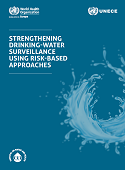Strengthening drinking-water surveillance using risk-based approaches (2019)

Download
2019, v + 43 pages
ISBN 978 92 890 5443 0
The framework for safe drinking-water recommended by the WHO guidelines for drinking-water quality promotes a risk-based preventive management approach to ensure safety of drinking-water. Independent drinking-water surveillance is one of the core components of this framework and is an essential public health function. To be effective, drinking-water surveillance needs to be aligned with risk-based principles, including prioritization of monitoring parameters and surveillance efforts based on water safety plan outcomes. Risk-based drinking-water surveillance comprises an independent and periodic review of all aspects of drinking-water quality and public health safety in which water-quality monitoring, on-site inspections, hazard identification and risk and trend analysis are important components. Applying a risk-based approach in drinking-water surveillance helps countries to focus on the issues that are most important for the protection of public health and so maximizes the benefits that can accrue from limited resources.



